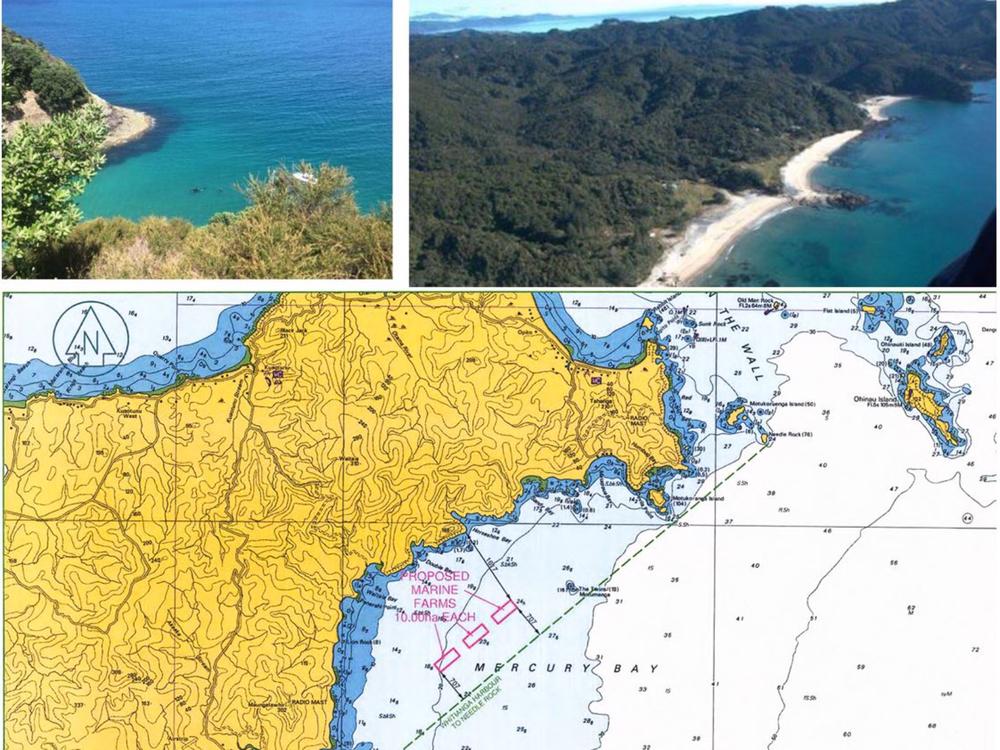
Save Mercury Bay
Please help us save Mercury Bay. We oppose a 30 hectare mussel spat farm proposed for Mercury Bay.
Waikato

A Resource Consent to construct a 30 Hectare mussel spat farm in Mercury Bay, Coromandel has been granted by Waikato Regional Council. It will be 2km in length and the size of 30 rugby fields.
Save Mercury Bay Trust opposes this and is supporting an appeal in the Environment Court. We oppose the farm because of:
1. Adverse landscape and natural character effects: we are concerned the mussel spat farm will be an unsightly industrial type structure on the eastern side of Mercury Bay.
2. The effect it will have on the environment: New Zealand has only 200 Orca and they are regular visitors to this part of Mercury Bay marine alongside other mammals such as dolphins, seals, and whales. The mussel spat lines will pose an entanglement risk to these mammals. We are concerned that even one entanglement will have dire effects on the population of some of these species.
3. The rubbish that will be created by the mussel spat farm washing up on surrounding beaches.
4. Biosecurity risks: invasive species such as Mediterranean Fan Worm and Undaria could be introduced by the transportation of mussel farm equipment coming over from the Firth of Thames. This could put native species at risk.
Mercury Bay is one of New Zealand’s treasures. The mussel spat farm will change forever how we sail, fish, sightsee and travel safely across the bay.
For more information visit the Save Mercury Bay Facebook page.
About us
The Save Mercury Bay Trust has been established to preserve one of New Zealand's treasures - Mercury Bay. It opposes mussel farming in Mercury Bay.
Use of funds
We need public support to pay for legal costs and expert witnesses. If the applicants withdraw their application or we are unable to raise sufficient funds any funds donated and unused by the Trust will go to the Whitianga Coast Guard.
Other page links
Latest update
Update November 2022 – A Win and a Loss! 14 December 2022
On November 4, the Environment Court acknowledged the biosecurity risks of the transfer to Mercury Bay of invasive, uncontrollable pests present in mussel farms in the Coromandel. The Win.
These pests are not in Mercury Bay. We now have hope to keep it that way!
We want to thank all our supporters over the last 4 years who have got us to this point.
However, the Court also ruled that the mussel spat farm can proceed if new ropes for the spat catch are used each time. (The Loss). The applicant or sponsor of the project had wanted to bring used ropes back and forth from sites in the Coromandel. This means that the sponsors could go ahead with a permanent infrastructure in place for the farm and use new ropes. That is a lot of plastic shedding ropes - around 700 km!
What next?
An appeal to the High Court? We disagree with the Environment Court’s earlier findings and have lodged an appeal: there are risks to mammals, seabirds from plastic waste, recreational users of Mercury Bay; there will be debris and light pollution from flashing lights. The adjacent coastline is an area of outstanding natural beauty! We are considering this appeal, but further funding is a concern.
Community/Tourist opposition and pressure on our appointed representatives?
There is so much wrong with having this farm in Mercury Bay.
DOC is consulting on doubling the size of Whanganui-a-Hei (Cathedral Cove) marine reserve on the other side of Mercury Bay. So, only in part of Mercury Bay the sponsors of the expansion care about the environment?
Did you know that mussel farms are banned in Mercury Bay? But a spat mussel farm that catches baby mussels swimming in the sea and growing them until they can be transferred elsewhere to grow to full size, is not classed as a mussel farm. It makes no sense. It looks like and is a type of mussel farm.
Is this farm needed? There are alternative options: 1) The experts say, “344 billion spat are harvested each year, but <1% of these are retained on farms from seeding through to final harvest. Improving efficiency by even a small percentage would produce substantial gains for industry.” Prof. A Jeffs et al. 2) Grow spat in onshore facilities and 3) offshore spat farms.
We will keep you informed about the WRC final consent and any further actions we might take.
We thank you once again for your support.
The Save the Mercury Bay Trust savemercurybay.trust@gmail.com
Latest donations





Who's involved?
Fundraisers supporting us
Page Q&A
Ask a question hereAny concerns?
Report this pageThank the donor
Your message will be displayed on the page and emailed to the donor.
Your new message will also be emailed to the donor.
Saving a blank entry will delete the current comment.

